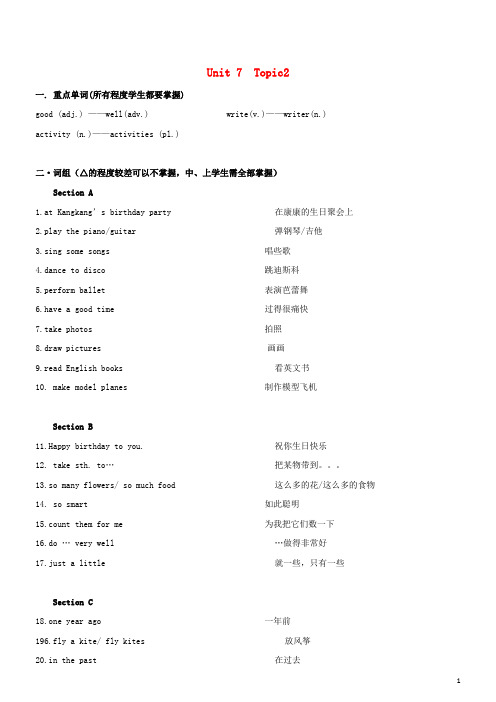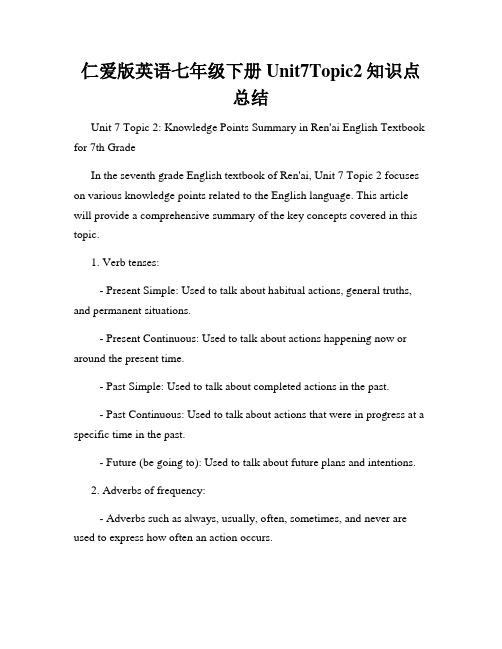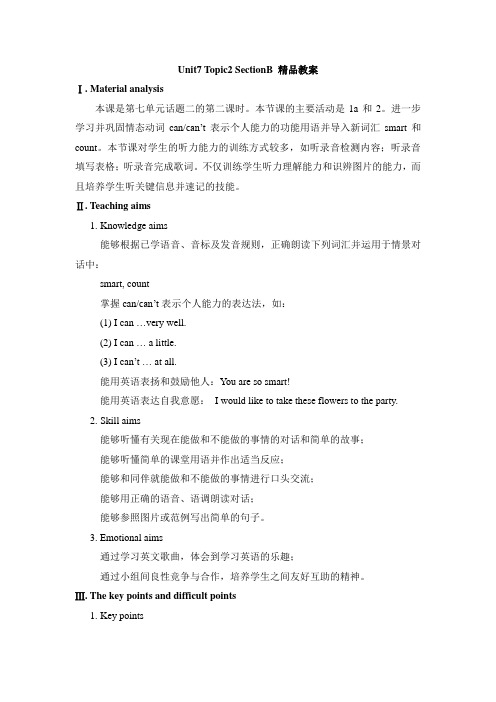仁爱版七年级英语下册unit7 topic2教材讲解
七年级英语下册 Unit 7 Topic 2 I can dance and play the guitar讲义 (新版)仁爱版

Unit 7 Topic2一. 重点单词(所有程度学生都要掌握)good (adj.) ——well(adv.) write(v.)——writer(n.)activity (n.)——activities (pl.)二·词组(△的程度较差可以不掌握,中、上学生需全部掌握)Section A1.at Kangkang’s birthday party 在康康的生日聚会上2.play the piano/guitar 弹钢琴/吉他3.sing some songs 唱些歌4.dance to disco 跳迪斯科5.perform ballet 表演芭蕾舞6.have a good time 过得很痛快7.take photos 拍照8.draw pictures 画画9.read English books 看英文书10. make model planes 制作模型飞机Section B11.Happy birthday to you. 祝你生日快乐12. take sth. to…把某物带到。
13.so many flowers/ so much food 这么多的花/这么多的食物14. so smart 如此聪明15.count them for me 为我把它们数一下16.do … very well …做得非常好17.just a little 就一些,只有一些Section C18.one year ago 一年前196.fly a kite/ fly kites 放风筝20.in the past 在过去st year/next year 去年/明年Section D22.live in London 住在伦敦23. at the age of five 在五岁时24. a few words 一些单词25. not… any more 不再,再也不26. with sb’s help =with the help of sb. 在某人的帮助下27 her first book 她的第一本书28. want to be…想要成为…三.重点句子(所有程度学生都要掌握)Section A1. Oh, do you want to sing Chinese songs or English songs?哦,你想唱中文歌曲还是英文歌曲?此句是选择疑问句,即提供两种或两种以上情况以供对方选择。
最新仁爱版英语七年级下册Unit7Topic2语法专项课件(情态动词can和could的用法)

③表示请求或允许。
③表示请求,语气更委婉。
易错点1 can 和 could的区别
It can't be true. (表推测,can用于否定句) We could go there this summer. (表推测,不限句式)
易错点1 can 和 could的区别
Can I use your pen? Could I use your pen?
A. can't
B. mustn't
C. may not
D. couldn't
考查情态动词。句意: —那个人一定是萨拉的丈 夫。 —不,那不可能是她丈夫。她是单身。根据句 意,表示确切的否定的推测选用 can't ,答案选 A。
can的用法
1. 表示能力时,意为“能、会”。 例:He can speak a little Japanese. 他会说一点日语。 2. 表示请求或许可时,意为“可以”。 例:Can I help you? 要我帮忙吗?
3. 表示猜测时,意为“可能”。 例:Where can she go now? 她现在可能到哪里去了呢?
一般疑问句:could提前 Could you speak English when yld的区别
can ①表示与生俱来的能力。
could ①表示过去拥有的一般的能力。
②表推测时,只用于否定句或疑 ②表推测时,可用于肯定句、否
问句中。
定句以及疑问句。
can的句式结构
肯定句:can + 动词原形 He can speak English. 否定句:can后加not(缩写为can't) He can not (can't) speak English
仁爱版英语七年级下册Unit7Topic2知识点总结

仁爱版英语七年级下册Unit7Topic2知识点总结Unit 7 Topic 2: Knowledge Points Summary in Ren'ai English Textbook for 7th GradeIn the seventh grade English textbook of Ren'ai, Unit 7 Topic 2 focuses on various knowledge points related to the English language. This article will provide a comprehensive summary of the key concepts covered in this topic.1. Verb tenses:- Present Simple: Used to talk about habitual actions, general truths, and permanent situations.- Present Continuous: Used to talk about actions happening now or around the present time.- Past Simple: Used to talk about completed actions in the past.- Past Continuous: Used to talk about actions that were in progress at a specific time in the past.- Future (be going to): Used to talk about future plans and intentions.2. Adverbs of frequency:- Adverbs such as always, usually, often, sometimes, and never are used to express how often an action occurs.- They are usually placed before the main verb, except when the main verb is "to be." In that case, the adverb is placed after "be."3. Comparatives and superlatives:- Comparatives are used to compare two things, while superlatives are used to compare more than two things.- Comparatives are formed by adding "-er" to short adjectives or using "more" before long adjectives.- Superlatives are formed by adding "-est" to short adjectives or using "most" before long adjectives.4. Quantifiers:- Quantifiers are words or phrases used to specify the quantity or amount of something.- Some common quantifiers include much, many, a lot of, a few, a little, and some.- They can be used with countable and uncountable nouns, but the choice of quantifier depends on the noun.5. Modal verbs:- Modal verbs are auxiliary verbs that express ability, possibility, necessity, or permission.- Common modal verbs include can, could, may, might, must, should, and would.6. Question forms:- There are two types of questions: yes/no questions and information questions.- Yes/no questions are formed by inverting the subject and the helping verb.- Information questions are formed by placing the question word at the beginning of the sentence.7. Direct and indirect speech:- Direct speech is when we report someone's words exactly as they were spoken.- Indirect speech is when we report someone's words indirectly, without using their exact words.- When changing from direct to indirect speech, tenses, pronouns, and time references often need to be adjusted.8. Prepositions of time and place:- Prepositions such as on, at, and in are used to express time and place relationships.- "On" is used with specific days, "at" is used with specific times, and "in" is used with months, years, and longer periods.- Prepositions of place, such as "in," "on," and "at," indicate where something is located.This summary provides a brief overview of the key knowledge points covered in Unit 7 Topic 2 of the Ren'ai English textbook for seventh graders.By understanding and practicing these concepts, students can enhance their English language skills and improve their proficiency in communication.。
仁爱版七年级英语下册课件:Unit7 Topic2 SectionA课件

Homework
• Do the exercises in the workbook ( P66-P67)
• Preview Section B.
自学检测一
从方框中选择正确的单词填空。 song, disco, else, piano, perform
1. Can you play the piano ? 2. What else can you see in the picture? 3. I’d like to dance to ? disco 4. My cousin can perform ballet very well. 5. Do you want to sing an English song ?
Summary
1. New words: piano, else, disco, perform, ballet 2. Phases: dance to disco, perform ballet, have a good time... 3. Sentence structures: Do you want to sing Chinese songs or English songs? What else can you do? I’m sure we’ll have a good time at the party. I can...../Can you....?
Maria
自学检测二
1. 翻译下列词组: 弹钢琴 迪斯科
play the piano
弹吉他
dance to disco
表演芭蕾 确信
play the guitar
唱中文歌 唱英文歌
perform ballet be sure have a good time
仁爱版英语七年级下册 Unit7 Topic2 SectionB 精品教案

Unit7 Topic2 SectionB 精品教案Ⅰ. Material analysis本课是第七单元话题二的第二课时。
本节课的主要活动是1a和2。
进一步学习并巩固情态动词can/can’t表示个人能力的功能用语并导入新词汇smart和count。
本节课对学生的听力能力的训练方式较多,如听录音检测内容;听录音填写表格;听录音完成歌词。
不仅训练学生听力理解能力和识辨图片的能力,而且培养学生听关键信息并速记的技能。
Ⅱ. Teaching aims1.Knowledge aims能够根据已学语音、音标及发音规则,正确朗读下列词汇并运用于情景对话中:smart, count掌握can/can’t表示个人能力的表达法,如:(1) I can …very well.(2) I can … a little.(3) I can’t … at all.能用英语表扬和鼓励他人:You are so smart!能用英语表达自我意愿:I would like to take these flowers to the party.2.Skill aims能够听懂有关现在能做和不能做的事情的对话和简单的故事;能够听懂简单的课堂用语并作出适当反应;能够和同伴就能做和不能做的事情进行口头交流;能够用正确的语音、语调朗读对话;能够参照图片或范例写出简单的句子。
3. Emotional aims通过学习英文歌曲,体会到学习英语的乐趣;通过小组间良性竞争与合作,培养学生之间友好互助的精神。
Ⅲ. The key points and difficult points1.Key points能够应用情态动词can引导的Or Questions,如:—Can Ann dance or draw?—She can dance.能够用can/can’t表示能的有关程度,如:She can do it a little/very well.能够熟练使用表达自我意愿的表达方式。
仁爱英语七年级下册Unit 7 Topic 2 语法汇总 共22张PPT

类似}
help sb (to)do sth 帮助某人做某事 help sb with sth 帮助某人某事 with sb’s help= with the help of sb 在某人的帮助下 With her mother’s help,Jerry can write well now. help oneself to 随便享用
做某事 (2) want (sb)to do sth.= would like +(sb)
to do sth 想要做某事 want to be 想成为...... be有成为的意思,指成为什么职业的人。
4个说的区别: say+内容 :say it in English 用英语说它 speak+语言:speak English 说英语 talk 谈论 talk about sth. 谈论某事 talk with/to sb 和某人交谈 tell 告诉,讲述 tell sb. (not)to do பைடு நூலகம்th 告诉某人
特殊疑问句:What can you do? 回答:I can ... What else can you do?
I can swim but I can't play basketball. but 连接两个转折关系的句子。
情境对话:
I can draw pictures. What about you?(询问对方与前边提到
03
4个也的区别:too 肯定句末 (前面加逗号) either否定句末(前面加逗号) also 句中,放在实意动词前,be 动词
仁爱英语七年级下册Unit7 Topic 2 Section A教案新部编本

教师学科教案[ 20 – 20 学年度第__学期]任教学科:_____________任教年级:_____________任教老师:_____________xx市实验学校仁爱英语七年级下册Unit7 Topic 2Section A教案The main activities are 1a and 3.本课重点活动是1a和3。
Ⅰ. Teaching aims and demands 教学目标1. Learn some useful words and expressions:take photos,row, skate2. Learn "can" and "can’t" for ability and inability:(1)—Can you sing Chinese songs at Kangkang’s birthday party?—Yes, I can.(2)—Can you play the guitar?—No, I can’t.(3)—Can you dance?—Yes, I can.(4)—Can you take photos?—Yes, I can.(5)I can’t sing any Chinese songs.Ⅱ. Teaching aids 教具实物/卡片/挂图/录音机Ⅲ. Five-finger Teaching plan 五指教学方案Step 1 Review 第一步复习(时间: 10分钟)1.(让学生以小组为单位,复习以前学过的动词短语。
)(学生四人为一小组,列出已学过的动词短语,看哪一小组写得最多。
) T: Work in groups. Write as many verb phrases as you can. Let’ s see which group can write the most phrases. One phrase one point.Now, let’s begin.(每组写完后,派一个代表向全班同学汇报,然后老师把这些词组板书在黑板上。
仁爱英语七年级下册Unit7Topic2知识点

放风筝 五年前 在…岁时 再不 一点儿 去年 在过去 三个月前 带…去… 想成为
fly a kite \fly kites five years ago at the age of not…any more just a little last year in the past three months ago take…to… want to be
play the piano play the guitar sing Chinese songs dance to disco perform ballet have a good time read English books take photos speak Japanese outdoor activity
在某人的帮助下 with the help of = with one’s help …出问题了 something wrong with
谢谢!
仁爱英语七年级下册Unit7Topic2知识点
钢琴 别的,其他的 迪斯科 表演 芭蕾舞 聪明的 数数 以前 伦敦 单词
piano else dห้องสมุดไป่ตู้sco perform ballet smart count ago London word
弹钢琴 弹吉他 唱中文歌 跳迪斯科 表演芭蕾 玩儿的愉快 读英语书 照相 讲日语 户外活动
- 1、下载文档前请自行甄别文档内容的完整性,平台不提供额外的编辑、内容补充、找答案等附加服务。
- 2、"仅部分预览"的文档,不可在线预览部分如存在完整性等问题,可反馈申请退款(可完整预览的文档不适用该条件!)。
- 3、如文档侵犯您的权益,请联系客服反馈,我们会尽快为您处理(人工客服工作时间:9:00-18:30)。
Unit 7 The Birthday PartyTopic2 Can you dance or draw一. 重难点讲解1、Oh,do you want to sing Chinese songs or English songs?哦,你想唱中文歌曲还是英文歌曲?选择疑问句:提供两种或两种以上情况,以供对方选择。
(1)基本结构:①一般疑问句+ or + 对照选择项Eg: Do you like tea or milk? 你喜欢茶还是牛奶?②特殊疑问句,+ A选择项 + or +B选择项Eg: When can you come back,today or tomorrow?你什么时候回来,今天还是明天?(2)回答时不用yes 或no来回答,一般情况下是就供选择的两项或三项中的一项进行回答。
Eg: --Are you a teacher or a worker?你是教师还是工人?--I am a worker.我是工人。
--Which do you like,football or basketball?足球和篮球你喜欢哪一项?--I like football.我喜欢足球。
2、I love to,but I can’t sing Chinese songs.I can only sing English songs.我非常乐意,但是我不会唱中文歌曲,我只会唱英文歌曲。
can 表示能力,是情态动词,没有人称和数的变化。
句式结构:(1)陈述句:主语 + can/can’t + 谓语动词+ 其他。
Eg: I can play the piano,but I can’t play the guiter.我会弹钢琴,但我不会弹吉他。
(2)一般疑问句:can + 主语+ 动词原形+其他?Eg: Can you sing an English song?你会唱英文歌吗?(3)特殊疑问句:疑问代词/疑问副词+can +主语+动词原形+其他?Eg: What can he do at the meeting?他在会议上能做什么呢?3、What else can you do?你还会做什么别的吗?else 意为“别的,其他的”,用于疑问代词和疑问副词或不定代词nothing, nobody, something,anything等之后。
Eg: What else does he say? 他还说了些什么?I do n’t want anything else,thanks.我不想要其他东西了,谢谢。
Ask somebody else to help you.请其他人来帮帮你吧。
4、I’m sure we’ll have a good time at the party.我确信我们在聚会上会玩得高兴。
(1)be sure + (that)宾语从句确信/肯定……I’m sure (that)it will be fine tomorrow.我肯定明天是晴天。
He is sure he can do it well.他确信他能把这件事做好。
(2)be sure to do sth 一定要,务必做某事。
Eg: Be sure to give my best wishes to your family.请务必把我最美好的祝愿带给你的家人。
(3)”be sure (务必)/make sure(确保)+ (that)宾语从句”用于祈使句时,that从句常用一般现在时表将来,以强调某一要求。
Eg: Be sure(that) you finish your work in an hour务必在一个小时之内完成任务。
Make sure that you lock the door before you leave home.确保在离家之前锁好门。
⑷have a good time 玩得高兴,过得愉快。
类似的说法还有:Have a wonderful time /have a nice timeHave a good time = enjoy oneself/oneselves.Eg: Kangkang has a good time every day = Kangkang enjoys himself everyday.康康每天都过得很愉快。
They had a good time at Maria’s birthday = They enjoyed themselves at Maria’s birthday.他们在玛利亚的生日聚会上玩得很高兴。
5、No way! 不!(用来表示断然拒绝做某事。
)------Can I borrow your car?我能借你的汽车开开吗?------No way!不行!------Do you want to help?你想帮忙吗?------ No way!决不!No problem!没问题!,与“no way!”意思相反,用于欣然答应别人的请求。
Eg: ---can you help me (to) carry the book?你能帮我搬这个箱子吗?---No problem!没问题!6、I can dance. I can do it a little/very well. 我会跳舞,我能跳一点儿/很好。
Well是副词,修饰动词。
Eg: She can sing very well. 她唱得非常好。
当well表示身体健康状况时是形容词。
Eg: ---How are you today?今天你好吗?---I’m very well. 我很好。
good 形容词,常用来修饰名词或用在动词之后作表语,表示事物/人的质量,品行等。
Eg: Mr.wang is a good teacher , and he teaches very well.王先生是个好老师,他教得非常好。
7、You are so smart! 你太聪明了!smart “聪明的,灵巧的”,可与clever “聪明的”互换。
Eg: Sandy is a smart and hard-working student.桑迪是一个聪颖勤奋的学生。
8、I’d like to take these flowers to the party. 我想把这些鲜花带到聚会上。
take sb/sth to somewhere 带某人/某物去某地eg: My mother often takes me to the park.我妈妈常常带我去公园玩。
bring “带来,拿来”,take “带走”,两词的动作方向相反。
Bring your frind to the party. 带你的朋友来参加宴会吧。
Take this letter to the post office, please.请你把这封信带到邮局去寄了。
9、Er, no, I can’t count so many flowers to the party. 嗯,不,我数不清那么多的花。
(1)count 动词。
数,点数。
Eg: Little Val is two , but he can count from one to one hundred.小瓦尔只有两岁,但他能从一数到一百。
(2)so many “如此多”,后面接可数名词的复数形式Eg: There are so many buses on the road today.今天路上的公共汽车特别多。
so much “这么多,那么多”,后面接不可数名词。
Eg: There is so much rain this year.今年下了很多雨。
10、But one year ago, she could n’t do it at all. 但是在一年前,她根本不会。
Could是can的过去式,其否定式是couldn’t.Eg: Jim could swim when he was eight.吉姆八岁的时候就会游泳了。
I couldn’t ride a bake when I was ten.我十岁时不会骑自行车。
注意:问句中当表示请求许可时,用could比用can更加客气。
此时,could没有过去式的意思,只是语气更加委婉。
而回答时,仍用can回答。
如:-----Could I ask you some questions?我能问你一些问题吗?-----Of course you can.当然能。
11、But when she was five,,she could dance just a little.但是当她5岁时,她仅会跳一点儿舞。
When意为“当……时”,此处为连接副词,引导时间状语从句,放在主句提前时,用逗号与主句分开;放在主句后时,不用逗号与主句间隔。
Eg: He could swim when he was very toung.他年纪很小时就会游泳。
12、They both like playing ball games.他们两个都喜欢球类运动。
(1)both意为“两者都”,作they的同位语,把它放在实义动词前,be动词后面。
Eg: We are both students. 我们俩都是学生。
They both like table tennis. 他们俩都喜欢打乒乓球。
(2)三者或三者以上“都”,用all.Eg: My parents are both Chinese. 我的父母都是中国人。
My friends all went to the park yesterday.我的朋友们昨天都去了公园。
(3)both (of the) + 复数名词both of + 复数代词eg: Both (of the) boys are very good.两个男孩都很优秀。
Both of them come from China.他们两个人都来自中国。
13、Kangkang is good at playing soccer,while Michael does well in basketball.康康擅长踢足球,而迈克尔篮球打得很好。
(1)be good at doing sth/sth 擅长做某事/某事。
(描述某人与生具有的能力)do well in doing sth/well擅长做某事/某事。
(强调通过后天努力而达到的状态) eg:The twins are good at dancing.这对双胞胎擅长跳舞。
Li Lei does well in math.李磊数学学得很好。
(2)be good for sth 对……有益Eg: Doing eye exercises is good for our eyes.做眼保健操对我们的眼睛有益。
